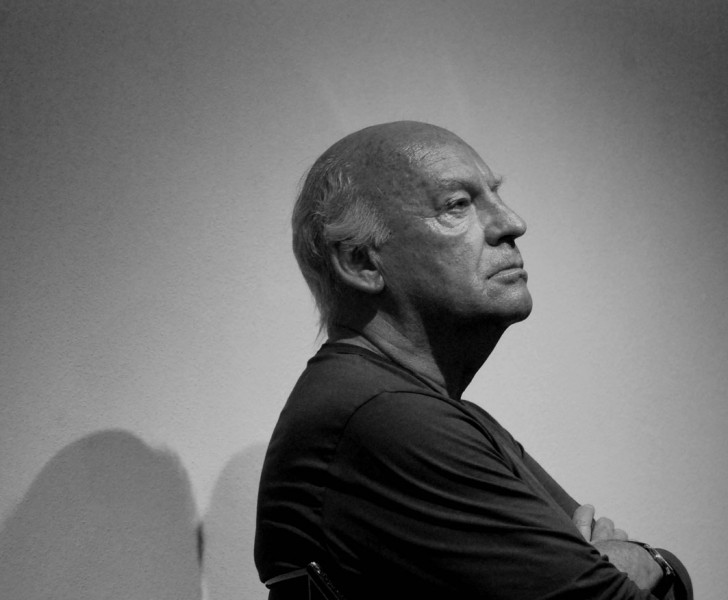Fernanda Canofre contributed to this post.
Eduardo Galeano's book The Open Veins of Latin America, famously presented to Barack Obama by Hugo Chavez, will always be his magnum opus, even though the Uruguayan writer later distanced himself from the work, characterizing it as the product of an overly ambitious young mind.
Less well known but equally groundbreaking is his book Su majestad, el fútbol (His Majesty, Soccer), written in 1968. At the time, Latin American intellectuals were reluctant to consider the sport a topic worthy of either serious thought or the pen of a serious writer. But Galeano never renounced this early work nor any of the other texts he devoted to the so-called opium of the people.
Instead he decided to play along, arming himself with passages from esteemed writers such as Albert Camus, Mario Benedetti, Horacio Quiroga and others. Unlike the prose of The Open Veins of Latin America, which brims with youthful passion, Galeano's musings about soccer are deeply philosophical. In 1995, when he was already entering the autumn of his life, Galeano dared to ask:
¿En qué se parece el fútbol a Dios? En la devoción que le tienen muchos creyentes y en la desconfianza que le tienen muchos intelectuales.
In what way does soccer resemble God? In the devotion of its followers and in the mistrust it engenders in many intellectuals.
This is the theme Galeano explores in the pages of Soccer in Sun and Shadow, a work in which the author conjures up the player, for whom the ball is really a shot at upward mobility; the referee, uniformly hated by everyone; and of course the fan, who craves goals more than victories.
Galeano riffs on the same philosophical questions in Futbolerías, one of the episodes from a televised series in which he explains his vision of Latin America and the world:
The writer reflects on the power structure inherent in soccer and finds parallels between what happens on the playing field and in the corporate arena that was created by a surge of neoliberal economic policies in the 1990s:
A medida que el deporte se ha hecho industria ha ido desterrando la belleza que nace de la alegría de jugar por que sí”.
As the game becomes a business, it destroys the beauty born from the joy of playing simply because you can.
Nevertheless Galeano underscores the role that professional soccer played in changing the lives of some of its greatest stars, players whose talent on the pitch earned them a place in history rather than in the annals of crime, a common fate for many in disadvantaged neighbourhoods. In Futbolerías, Galeano recounts both the history and the stories of the Beautiful Game. He shares important anecdotes and draws connections between social movements and the different eras that left their mark on the world of soccer.
Among his last contributions to the subject was his noteworthy appearance at the literary festival that took place in Brasilia in 2014. He took the opportunity to draw attention to the Chilean Club Social y Deportivo Colo Colo, whose players had been demanding greater participation in the team, claiming it had been held hostage by management:
Pienso que todo ese movimiento es necesario para la recuperación de los clubes, para que vuelvan a ser lo que ellos quieren ser, o sea, un conjunto de personas ligadas por amor a una camiseta y una pasión futbolística y no por intereses económicos o políticos”
I think that this whole movement is necessary to take back the clubs, so that they can once again be what they want to be, in other words an association of people bound together by the love of a jersey and a passion for the game, and not for economic or political interests.
Social media continues to highlight Galeano's legacy. Twitter in particular is full of quotes from his works and his unique take on soccer. Many emphasize Galeano's originality and provocative spirit as evidenced by his willingness to spill so much ink on the world's most popular game:
Eduardo Galeano desvirtuó esa superioridad intelectual de los que creen que el fútbol un gusto de ignorantes.
— Carolina (@Caromunozb) April 17, 2015
Eduardo Galeano negated the intellectual superiority of those who believe soccer is just for the uneducated.
Others remembered the writer's reflections on a more profound aspect of the game:
“En los conflictos en el mundo, el fútbol es el único instrumento de conciliación que no ha fracasado” Galeano DEP pic.twitter.com/NguiAhvKmF
— Revista Líbero (@revistalibero) April 13, 2015
“Among the conflicts in the world, soccer is the only method of conciliation that hasn't failed.” Galeano DEP pic.twitter.com/NguiAhvKmF
And finally, there were signs of mourning for a distinguished voice that carved out a place for soccer in the lofty sphere of literature:
El fallecimiento de Eduardo Galeano impacta y duele. Nadie pudo entregar una descripción tan poética del fútbol como el.
— Martin Charquero (@MartinCharquero) April 13, 2015
The death of Eduardo Galeano is affecting and painful. No-one but he could write such poetic words about soccer.







